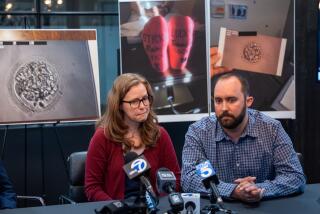HIV Peril in Artificial Insemination Cited : Health: Woman, infected by carrier of virus that causes AIDS, urges others to make sure that clinics do proper tests.
- Share via
LAGUNA NIGUEL — Mary Orsak has a warning for women who try to have a baby through artificial insemination: Be certain that the donor of the semen is tested for the AIDS virus.
She says that others may be as unsuspecting as she was 10 years ago when she went to a fertility clinic in Los Angeles in hope of having a child. Instead, two years ago she received a phone call from the clinic telling her that the donor of the sperm with which she had been inseminated eight times was a carrier of the virus that causes AIDS.
Between June, 1981, and May, 1985, the donor, then a UCLA student, provided semen that was used by the Tyler Medical Clinic to inseminate 53 women, according to Happy Araneta, a former epidemiologist with the Los Angeles County Health Department. So far, two of these women have tested positive for HIV, Araneta said. Another six cannot be located or have been unwilling to be tested.
The discovery came after a San Luis Obispo physician told health officials in Los Angeles that he believed a patient had contracted HIV through artificial insemination. The woman, Araneta said, happened to learn that she was HIV positive when she had a blood test for elective surgery.
Orsak, 41, said she received a call in 1992 advising her to be tested because one of her donors had AIDS.
“When I found out I was positive, I got the screaming meemies. I thought I’m dying,” she recalled. She said her husband, Joe, has tested negative.
The Orsaks, who have an adopted son, have sued Dr. Jaroslav Marik, medical director of the Tyler Clinic, and the clinic, alleging that “very little or no screening procedures” were used on donors, according to an Associated Press story. Marik could not be reached by The Times for comment Thursday.
Marik told the AP that his clinic has always tested donors for HIV as technology permitted.
“You can imagine that this is a tragedy for everyone concerned,” he told AP. “That donor was used in the early 1980s. There was no way to test him.”
Araneta said blood testing for HIV became commercially available in the spring of 1985. She advises that “all women who received artificial insemination procedures before 1985, especially those residing in AIDS-prevalent areas, should be tested for HIV antibodies.”
Orsak’s is one of five documented cases in the United States of women becoming infected with human immunodeficiency virus from donor sperm, Araneta said, including four Southern Californians whose condition was diagnosed within the past three years. In addition, she said, there are two cases in Vancouver. “I am concerned that a lot may be missed,” she said.
The Tyler Clinic case, Araneta said, raises questions about who is susceptible to AIDS and how the disease selects its victims.
“Why were these two women infected and the other 52 were not?” she asked. One of the women who escaped infection, she said, was inseminated 26 times with semen from the HIV-positive donor.
Mary Orsak, who still is healthy and active, said she is grateful to have learned that she is HIV-infected in time to receive early treatment that may prolong her life. “I want to live as normal a life as possible, loving people and helping people as I can,” she said.
More to Read
Sign up for Essential California
The most important California stories and recommendations in your inbox every morning.
You may occasionally receive promotional content from the Los Angeles Times.













